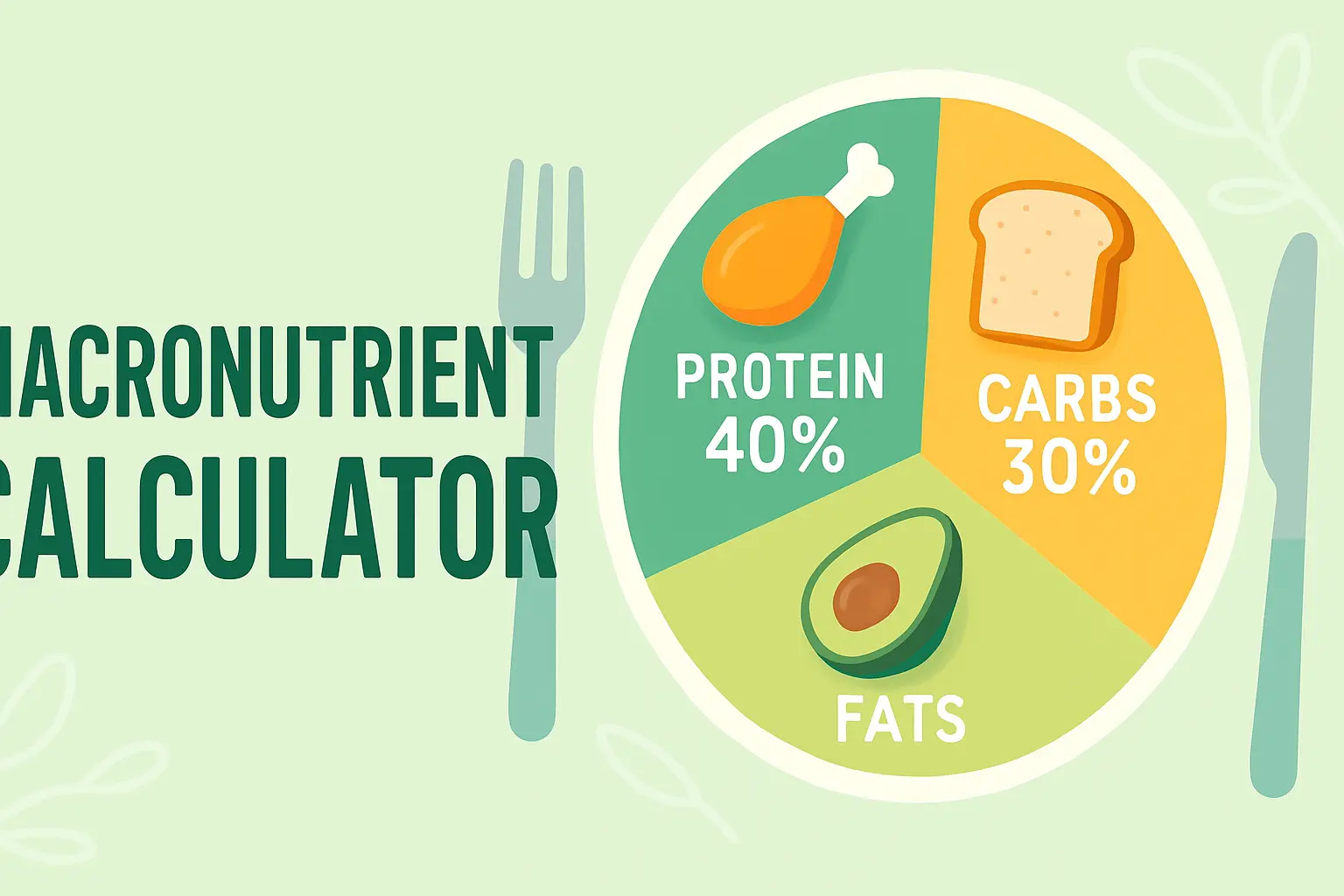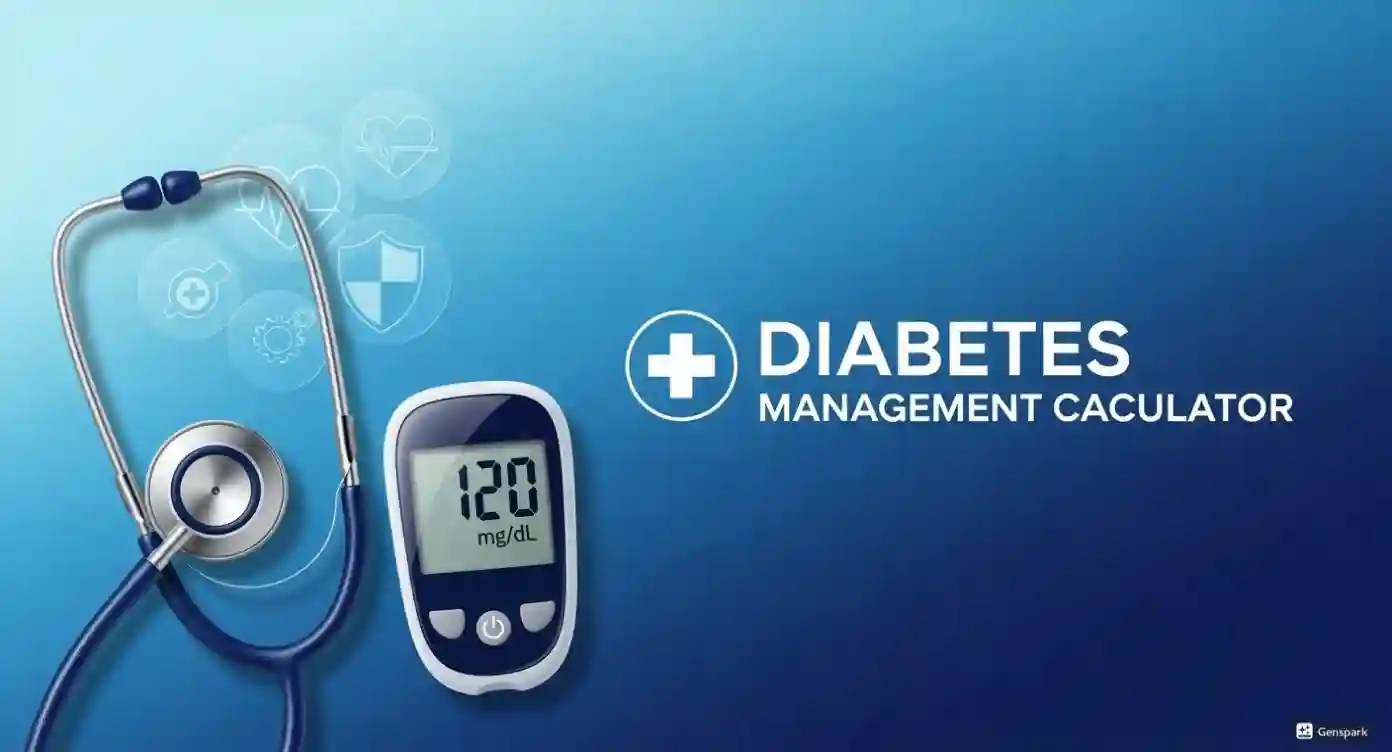Diabetes Management Calculator
Track your blood sugar levels, assess your diabetes risk, and receive personalized AI-powered health advice for better diabetes management and lifestyle optimization.
Smart Calculator
AI Advice
Risk Assessment
Table of Contents
Diabetes Management Calculator
Personal Information
Blood Sugar Information
Your Health Metrics
AI-Powered Personalized Advice
Blood Sugar Level Analysis
Understanding Diabetes: A Comprehensive Guide
Diabetes is a chronic medical condition that affects millions of people worldwide. The diabetes management calculator is an essential tool for understanding your current health status and risk levels. When your body cannot properly process glucose (blood sugar), it leads to elevated blood sugar levels, which can cause serious health complications if left unmanaged. The diabetes management calculator helps you track these levels and provides personalized insights for better health outcomes.
Type 1 Diabetes
An autoimmune condition where the body attacks insulin-producing cells in the pancreas. Usually diagnosed in childhood or young adulthood.
Type 2 Diabetes
The most common form, where the body becomes resistant to insulin or doesn't produce enough. Often linked to lifestyle factors.
Prediabetes
A condition where blood sugar levels are higher than normal but not high enough to be classified as diabetes.
The diabetes management calculator takes into account various factors including your age, gender, height, weight, and current blood sugar levels to provide a comprehensive risk assessment. This tool is particularly valuable because it combines traditional risk assessment methods with modern AI technology to deliver personalized recommendations that can help you take proactive steps toward better health management.
Blood Sugar Level Ranges and What They Mean
Understanding blood sugar levels is crucial for effective diabetes management. The diabetes management calculator uses established medical guidelines to categorize your blood sugar readings and provide appropriate risk assessments. These ranges vary depending on when the test is taken and your individual health circumstances.
| Test Type | Normal | Prediabetes | Diabetes |
|---|---|---|---|
| Fasting (8+ hours) | Less than 100 mg/dL | 100-125 mg/dL | 126 mg/dL or higher |
| Random | Less than 140 mg/dL | 140-199 mg/dL | 200 mg/dL or higher |
| 2 Hours After Meal | Less than 140 mg/dL | 140-199 mg/dL | 200 mg/dL or higher |
The diabetes management calculator considers these ranges along with your personal health metrics to provide accurate risk assessments. It's important to note that a single high reading doesn't necessarily indicate diabetes – the diagnosis typically requires multiple tests showing consistently elevated levels. Regular monitoring using tools like our diabetes management calculator can help you track patterns and identify potential concerns early.
Diabetes Risk Factors: What Increases Your Chances
The diabetes management calculator evaluates multiple risk factors to provide comprehensive health insights. Understanding these risk factors is essential for prevention and early intervention. Some factors cannot be changed, while others can be modified through lifestyle adjustments and proper medical care.
Non-Modifiable Risk Factors
- Age (45 years or older)
- Family history of diabetes
- Ethnicity (African American, Hispanic, Native American, Asian)
- History of gestational diabetes
- Polycystic ovary syndrome (PCOS)
Modifiable Risk Factors
- Overweight or obesity (BMI ≥25)
- Physical inactivity
- High blood pressure
- Abnormal cholesterol levels
- Poor diet and eating habits
The diabetes management calculator incorporates many of these risk factors to provide personalized risk assessments. By focusing on modifiable risk factors, you can significantly reduce your chances of developing type 2 diabetes or better manage existing diabetes. Tools like our BMI calculator can help you assess whether weight management should be part of your diabetes prevention strategy.
Natural Diabetes Management: Evidence-Based Strategies
The diabetes management calculator not only assesses your current risk but also provides personalized recommendations for natural diabetes management. These evidence-based strategies can help improve blood sugar control, reduce complications, and enhance overall quality of life. Natural management approaches work best when combined with regular medical care and monitoring.
Mindful Eating
Practice portion control, eat slowly, and focus on nutrient-dense foods to naturally regulate blood sugar levels.
Regular Exercise
Engage in at least 150 minutes of moderate-intensity exercise weekly to improve insulin sensitivity.
Quality Sleep
Aim for 7-9 hours of quality sleep nightly to help regulate hormones that control blood sugar.
Stress Management
Practice meditation, yoga, or deep breathing to reduce stress-induced blood sugar spikes.
Proper Hydration
Stay well-hydrated with water to help kidneys flush out excess glucose through urine.
Natural Supplements
Consider chromium, cinnamon, or berberine supplements under medical guidance for blood sugar support.
The diabetes management calculator takes into account your lifestyle factors to provide tailored recommendations. Natural management strategies are most effective when implemented consistently and monitored regularly. Using our water intake calculator can help ensure you're maintaining proper hydration levels as part of your diabetes management plan.
Optimal Diet and Nutrition for Diabetes Management
Nutrition plays a pivotal role in diabetes management, and the diabetes management calculator considers dietary factors when providing personalized recommendations. A well-planned diet can help maintain stable blood sugar levels, support weight management, and reduce the risk of complications. The key is understanding how different foods affect your blood glucose and making informed choices.
The Diabetes Plate Method
Non-Starchy Vegetables
Leafy greens, broccoli, peppers, tomatoes
Lean Proteins
Fish, chicken, beans, tofu
Complex Carbs
Brown rice, quinoa, sweet potatoes
Foods to Emphasize
- High-fiber vegetables and fruits
- Whole grains and legumes
- Lean proteins and healthy fats
- Nuts, seeds, and avocados
- Fatty fish rich in omega-3s
Foods to Limit
- Refined sugars and sweets
- Processed and fast foods
- Sugary beverages and sodas
- White bread and refined grains
- High-sodium processed meats
The diabetes management calculator considers your current weight and health metrics to provide personalized dietary recommendations. Proper nutrition is fundamental to diabetes management, and tools like our daily calorie calculator can help you determine appropriate caloric intake for your individual needs and health goals.
Exercise and Fitness for Effective Diabetes Management
Regular physical activity is one of the most powerful tools for diabetes management, and the diabetes management calculator incorporates activity level considerations into its recommendations. Exercise helps improve insulin sensitivity, lower blood glucose levels, reduce cardiovascular risk, and enhance overall well-being. The key is finding activities you enjoy and can maintain consistently.
Aerobic Exercise Benefits
- Improves cardiovascular health and reduces heart disease risk
- Supports healthy weight management and fat loss
- Increases insulin sensitivity for better glucose control
- Enhances mood and reduces stress levels
Strength Training Benefits
- Builds lean muscle mass to improve glucose uptake
- Increases metabolic rate and calorie burning
- Strengthens bones and improves bone density
- Reduces risk of diabetes-related complications
Weekly Exercise Recommendations
Minutes of moderate-intensity aerobic activity per week
Strength training sessions targeting all major muscle groups
Flexibility and balance activities like yoga or tai chi
The diabetes management calculator can help you understand how your current activity level affects your diabetes risk and provide personalized exercise recommendations. Remember to start slowly if you're new to exercise and gradually increase intensity and duration. Always consult with your healthcare provider before beginning a new exercise program, especially if you have existing health conditions or complications from diabetes.
Blood Sugar Monitoring and Health Tracking Strategies
Effective diabetes management relies heavily on consistent monitoring and tracking of various health metrics. The diabetes management calculator provides a snapshot of your current status, but regular monitoring helps you understand patterns, identify triggers, and make informed decisions about your health. Modern technology has made tracking easier and more accurate than ever before.
Blood Glucose
Monitor 2-4 times daily or as recommended by your doctor
Weight
Weekly weigh-ins to track progress and maintain healthy weight
Blood Pressure
Regular monitoring to prevent cardiovascular complications
Food Intake
Track meals, carbohydrates, and portion sizes
Essential Health Metrics to Track
Daily Tracking
- • Blood glucose readings
- • Medication timing and dosage
- • Physical activity and exercise
- • Food intake and carb counting
- • Sleep quality and duration
Periodic Monitoring
- • HbA1c levels (every 3-6 months)
- • Blood pressure checks
- • Cholesterol and lipid panels
- • Kidney function tests
- • Eye and foot examinations
The diabetes management calculator serves as an excellent starting point for understanding your health status, but consistent tracking provides the detailed information needed for optimal diabetes management. Technology can be a valuable ally in this process, with smartphone apps, continuous glucose monitors, and digital health platforms making it easier to maintain detailed health records and spot important trends over time.
Preventing Diabetes Complications Through Proactive Management
One of the primary goals of using a diabetes management calculator is to help prevent serious complications that can arise from uncontrolled blood sugar levels. Diabetes complications can affect virtually every organ system in the body, but with proper management, monitoring, and lifestyle modifications, most complications can be prevented or significantly delayed.
Cardiovascular Disease
Diabetes increases risk of heart disease, stroke, and high blood pressure.
Diabetic Retinopathy
Damage to blood vessels in the retina can lead to vision problems or blindness.
Kidney Disease
High blood sugar can damage kidney filters, leading to kidney failure.
Neuropathy
Nerve damage can cause pain, numbness, and loss of sensation, especially in feet.
Dental Problems
Increased risk of gum disease, tooth decay, and oral infections.
Slow Wound Healing
Poor blood circulation and immune function can slow healing of cuts and wounds.
The ABCs of Diabetes Management
A1C Levels
Keep HbA1c below 7% (or as recommended by your doctor)
Blood Pressure
Maintain blood pressure below 140/90 mmHg (or as advised)
Cholesterol
Keep LDL cholesterol below 100 mg/dL (or as recommended)
The diabetes management calculator helps you understand your current risk level and provides personalized recommendations to prevent complications. Early detection and consistent management are key to preventing serious health issues. According to the Centers for Disease Control and Prevention, proper diabetes management can reduce the risk of complications by up to 40-60%.
Integrating Diabetes Management into Daily Life
Successfully managing diabetes requires integrating healthy habits into your daily routine rather than viewing it as a separate aspect of your life. The diabetes management calculator provides insights that can help you make informed decisions about daily activities, meal planning, and lifestyle choices. The goal is to create sustainable habits that support long-term health without feeling overwhelming or restrictive.
Morning Routine
- • Check blood sugar levels upon waking
- • Take medications as prescribed
- • Eat a balanced breakfast with protein and fiber
- • Plan meals and snacks for the day
- • Review your daily health goals
Evening Routine
- • Record blood sugar readings and meals
- • Reflect on the day's challenges and successes
- • Prepare healthy snacks for the next day
- • Practice stress-reduction techniques
- • Ensure proper sleep hygiene
The diabetes management calculator can help you understand how different lifestyle factors affect your overall diabetes risk and blood sugar control. Building consistent routines makes diabetes management feel more natural and less burdensome, ultimately leading to better long-term health outcomes and improved quality of life.
Technology and Innovation in Diabetes Management
Modern technology has revolutionized diabetes management, making it easier and more precise than ever before. The diabetes management calculator represents just one example of how digital tools can provide personalized health insights. From continuous glucose monitors to smartphone apps and artificial intelligence, technology is empowering individuals with diabetes to take better control of their health.
Continuous Glucose Monitors
Real-time blood sugar tracking with alerts for high and low glucose levels.
Smart Insulin Pens
Track insulin doses, timing, and provide reminders for medication adherence.
AI Health Assistants
Personalized recommendations based on individual health patterns and data.
The diabetes management calculator utilizes advanced AI technology to provide personalized recommendations based on your individual health profile. As technology continues to evolve, we can expect even more sophisticated tools that will make diabetes management more precise, convenient, and effective for millions of people worldwide.
Building Your Diabetes Support Network
Managing diabetes is not a journey you have to take alone. Building a strong support network is crucial for long-term success, and the diabetes management calculator can be part of that support system by providing you with information to share with your healthcare team. A comprehensive support network includes healthcare professionals, family members, friends, and peer support groups who understand the challenges of living with diabetes.
Healthcare Team
- • Primary care physician or endocrinologist
- • Certified diabetes educator
- • Registered dietitian
- • Pharmacist
- • Mental health counselor
- • Eye doctor and podiatrist
Personal Support
- • Family members and close friends
- • Diabetes support groups (online and local)
- • Workout partners and accountability buddies
- • Coworkers who understand your needs
- • Online communities and forums
- • Diabetes advocacy organizations
The diabetes management calculator provides valuable information that you can share with your support network to help them better understand your health status and needs. Remember that asking for help is a sign of strength, not weakness, and having people who understand and support your diabetes management efforts can make a significant difference in your overall success and well-being.
Frequently Asked Questions About Diabetes Management
How accurate is the diabetes management calculator?
The diabetes management calculator uses established medical guidelines and AI algorithms to provide accurate risk assessments based on the information you provide. However, it's designed to complement, not replace, professional medical advice. Always consult with your healthcare provider for definitive diagnosis and treatment recommendations.
How often should I check my blood sugar levels?
The frequency of blood sugar monitoring depends on your type of diabetes, treatment plan, and individual circumstances. People with Type 1 diabetes typically check 4-8 times daily, while those with Type 2 diabetes may check less frequently. Your healthcare provider will recommend the best monitoring schedule for your specific situation.
Can the diabetes management calculator help prevent diabetes?
Yes, the diabetes management calculator can help identify prediabetes and provide personalized recommendations for prevention. Studies show that lifestyle modifications can reduce the risk of developing Type 2 diabetes by up to 58%. Early intervention is key to preventing or delaying the onset of diabetes.
What should I do if my blood sugar is consistently high?
Consistently high blood sugar levels require immediate attention from your healthcare provider. In the meantime, increase water intake, engage in light physical activity if safe to do so, and review your medication adherence. Never ignore persistently high readings, as they can lead to serious complications.
Are natural remedies effective for diabetes management?
Many natural approaches can effectively support diabetes management, including dietary changes, regular exercise, stress reduction, and certain supplements. However, these should complement, not replace, prescribed medications. The diabetes management calculator incorporates evidence-based natural strategies into its recommendations.
How does stress affect blood sugar levels?
Stress can significantly impact blood sugar levels by triggering the release of hormones like cortisol and adrenaline, which can cause glucose levels to rise. Chronic stress can make diabetes management more challenging. The diabetes management calculator considers stress factors when providing personalized recommendations for blood sugar control.
Can I reverse Type 2 diabetes naturally?
While Type 2 diabetes is typically considered a chronic condition, some people can achieve remission through significant lifestyle changes, including substantial weight loss, dietary modifications, and increased physical activity. The diabetes management calculator can help identify strategies that may improve your blood sugar control and overall health outcomes.
What role does sleep play in diabetes management?
Quality sleep is crucial for diabetes management. Poor sleep can affect insulin sensitivity, increase stress hormones, and lead to elevated blood sugar levels. Adults should aim for 7-9 hours of quality sleep nightly. The diabetes management calculator considers sleep patterns when providing personalized health recommendations.
Conclusion: Taking Control of Your Diabetes Management Journey
The diabetes management calculator is more than just a tool – it's your partner in achieving better health outcomes and living well with diabetes. By providing personalized risk assessments, AI-powered recommendations, and evidence-based guidance, this calculator empowers you to make informed decisions about your health. Remember that effective diabetes management is a journey, not a destination, and small consistent steps can lead to significant improvements over time.
Whether you're newly diagnosed, have been managing diabetes for years, or are concerned about your risk levels, the diabetes management calculator provides valuable insights that can help guide your health decisions. Combined with regular medical care, a supportive network, and commitment to healthy lifestyle choices, you can successfully manage diabetes and maintain a high quality of life.
Take the first step toward better diabetes management today.
Use our diabetes management calculator to assess your risk and receive personalized recommendations for a healthier future.













